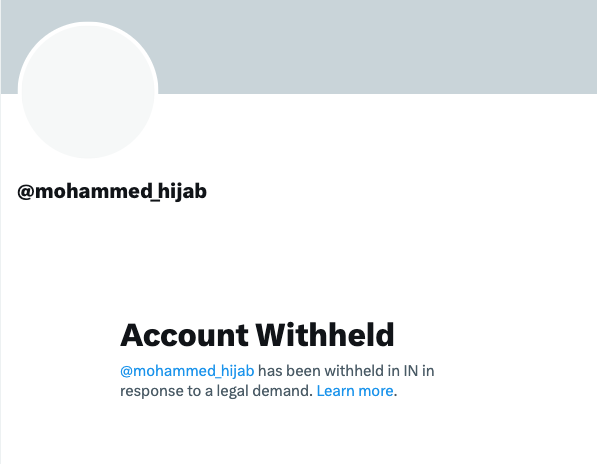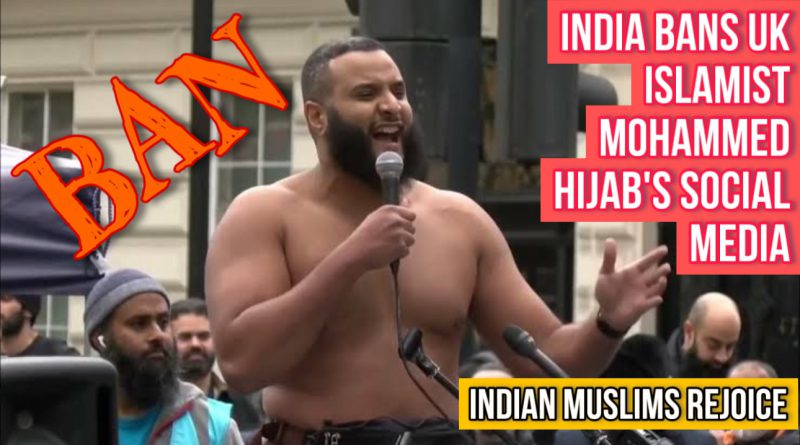India Bans UK Islamist Hijab’s Social Media for Backing Kashmir Terror
New Delhi — In a landmark move aimed at safeguarding national integrity and countering online radicalism, the Government of India has officially banned the social media handles and YouTube channel of UK-based Islamist influencer Mohammed Hijab, citing his support for Pakistan-backed terrorism in Kashmir and attempts to incite Indian Muslim youth against the state.
The decision follows a sweeping backlash from Indian Muslims themselves, who overwhelmingly condemned Hijab’s recent statements targeting their patriotism. The tipping point came after Hijab posted a controversial message on April 27, 2025, on X (formerly Twitter), declaring that any Indian Muslim siding with India on the Kashmir issue had “betrayed the ummah” and accusing them of disbelief, quoting Surah Al-Ma’idah (5:51).
“If any Indian Muslim sides with India on Kashmir, he betrays the ummah… Whoever allies with them is of them. And Allah does not guide the wrongdoing people.” – @mohammed_hijab, April 27, 2025
The Turning Point: Indian Muslims Fight Back
The post ignited a fierce and patriotic response from Indian Muslims across the country and the diaspora. Prominent voices, including intellectuals, religious scholars, journalists, and activists, launched a scathing rebuttal to Hijab’s takfiri rhetoric, defending their loyalty to India and rejecting the imposition of foreign Islamist ideologies.
This nationwide pushback was amplified by an exposé from Milli Chronicle UK, titled “Indian Muslims Slam UK Islamist Mohammed Hijab Over Kashmir Remarks”, which captured the firestorm that Hijab’s post unleashed.
Indian intelligence and cybercrime agencies reportedly escalated their monitoring of Hijab’s digital activities. Sources confirmed that Hijab’s platforms were being used to spread anti-India propaganda, glorify separatism, and subtly incite militancy, particularly in the sensitive Kashmir Valley.
Citing these violations, India invoked its Section 69A of Information Technology Act, 2000, resulting in Hijab’s official ban across Indian cyberspace. Major ISPs and social media companies were instructed to geo-block his content, and YouTube removed his channel from visibility within India.

Who is Mohammed Hijab?
Mohammed Hijab is a British-Egyptian YouTuber and self-proclaimed Islamic apologist, who gained notoriety through his debates at Speaker’s Corner in London and YouTube channels targeting atheists, Christians, Jews, and even moderate Muslims. Though not formally trained in Islamic scholarship, he claims credentials from Oxford and SOAS, yet has often been accused of spreading takfiri ideology and instigating religious hatred.
His resume includes:
- Leading violent demonstrations in Leicester (UK) in 2022 against Hindus.
- Making derogatory comments about reincarnation and calling Hindus “pathetic and cowardly.”
- Spewing anti-Semitic slurs during pro-Palestine rallies, where he was caught on tape threatening to “kill those dogs” (referring to Jews).
- Advocating violence and sectarianism under the guise of Islamic unity.
Strong Backlash from Within India
Indian Muslims quickly mobilized to denounce Hijab’s interference. Zahack Tanvir, a counter-extremism writer and founder of Milli Chronicle UK, accused Hijab of hypocrisy: “If Pakistan gave military bases to the US against the Taliban during the ‘War on Terror,’ doesn’t that make them disbelievers by your logic? Then why demand Indian Muslims side with Pakistan on Kashmir?”
Kashmiri scholar Arshia Malik condemned Hijab’s misogyny and irrelevance: “Hasn’t your ex-wife accused you of abuse? We don’t need you lecturing us. India is a liberal democracy—not a playground for takfiri fantasies.”
Mohammed Shoaib, a well-known Islamic debater, responded with visceral anger: “I’m an Indian Muslim. I support my India and its elected Hindutva government. F*** your Pakistani Ummah!”
From journalists like Zaira Nizam to activists like Shoeb Siddiqi, Indian Muslims unified to assert that their faith does not conflict with their patriotism.
“Kashmir is India’s pride. Supporting India isn’t betrayal of Ummah—it’s standing for truth,” said Saif Siddiqi.
The Kashmir Connection and Pahalgam Attack
The timing of Hijab’s incendiary remarks coincided with one of the deadliest terror attacks in Jammu & Kashmir since 2019. On April 22, 2025, armed terrorists attacked a tourist group in Pahalgam’s Baisaran Valley, killing 26 people. Investigations revealed cross-border support from Pakistani handlers, prompting a severe crackdown by Indian forces.
In this tense climate, Hijab’s tweet was perceived as tacit support for terrorism, inciting Muslims to reject their Indian identity. The government took swift action, citing “national security” and “digital de-radicalization.”
A Landmark Decision
This move marks the first time India has officially banned a foreign influencer’s entire online presence for spreading extremism, sending a strong signal to Islamist provocateurs exploiting social media to influence Indian youth.
Policy analysts hailed it as “a bold but necessary step to preserve India’s social fabric.”
In 2021, the CST did mention Mohammed Hijab in a report on antisemitism in the UK. They referred to him as an “influential Islamist YouTuber” who had been involved in antisemitic demonstrations.
A Victory for Moderate Voices
Perhaps the most heartening aspect of this development is the spontaneous unity displayed by Indian Muslims. In an age where online radicalization is a growing concern, Indian Muslims proved they are not swayed by divisive foreign clerics or Twitter preachers.
As Amana Ansari, a policy researcher, aptly said: “We have our voice. We don’t need foreign agents. Never did. Never will.”
This message was clear, forceful, and deeply patriotic—Indian Muslims stand with India. And Mohammed Hijab has no place in their discourse.


